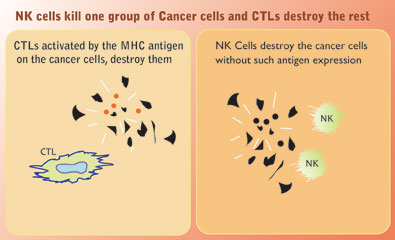Sample menu:
Everyday our body is invaded by a host of microbes and almost every day cancer cells are formed in our body. But we don’t get sick or affected by cancer every day. This is because of an efficient in built mechanism of our body ‘the Immune system. The immune system is a complex network of cells and organs comprising the lymphocytes, macrophages, Dendritic cells, Natural Killer cells (NK Cell), Cytotoxic T Lymphocytes (CTL), lymph nodes etc., that work together to defend the body against attacks by these "foreign" or "non-self" invaders including cancer cells.

The Immune system attacks any substance, cell or molecule that is considered as “non self”. Self/non-self recognition is based upon markers of a major histocompatibility complex that is displayed by a cell. We all know that Proteins are continually synthesized in the cell. These include the normal proteins necessary for the functioning of the cells of that particular individual (self) and then foreign proteins such as that of the microbe that infected the cell (non self). A MHC molecule inside the cell takes a fragment of those proteins and displays it on the cell surface. When the MHC-protein complex is displayed on the surface of the cell, it can be presented to a nearby immune cell like the T cell and NK cells. If the immune cell recognizes the protein as non self, it can kill the infected cell, and other infected cells displaying the same protein. So the cells of the immune system which are in the process of constant surveillance termed as “Immune surveillance” will grab these cells with a different MHC expression and kill them.
When normal cells turn into cancer cells, some of the antigens on their surface change. Hence they will be attacked by the Immune system cells during surveillance as they will be recognized as non self but when the Cancer cells grow to a number which overwhelms the capacity of the Immune system or if the Immune system breaks down, then cancer develops.
The view that cancers can be eradicated or at least their progression can be stopped by specific immune responses holds promise and forms the basis of cancer immunology






